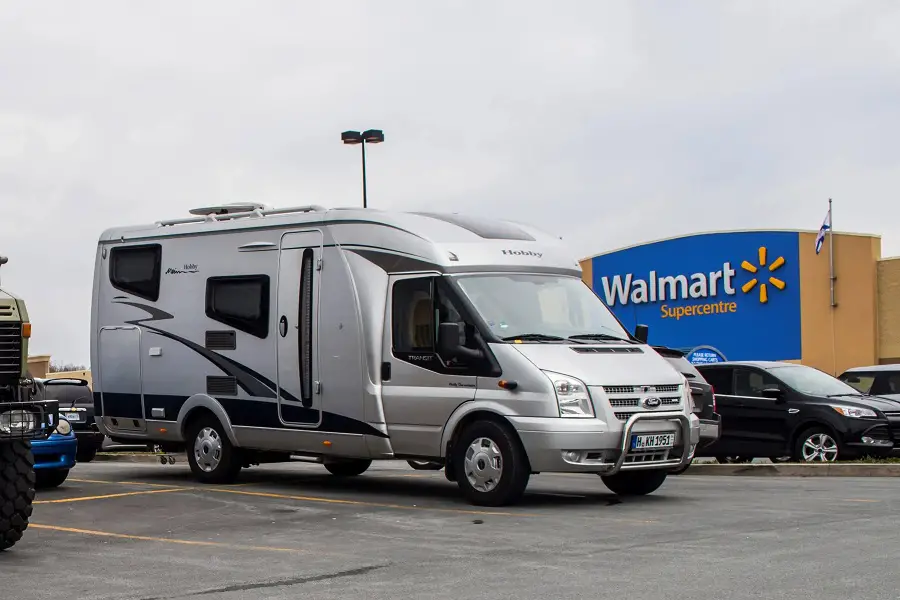Nobody goes camping to have a bad time. Every family, couple or solo camper in those nearby campsites came for a handful of things: relaxation, enjoyment, and some peace and quiet.
Whether you’re a first-time camper, or you have some first-time campers in your party for this trip, you can all benefit from this quick list of the eight most critical commandments of the campground.
The goal is to enjoy yourself while dually respecting everyone else’s time and right to peace and quiet. Let’s make it happen.
1. Leave No Trace
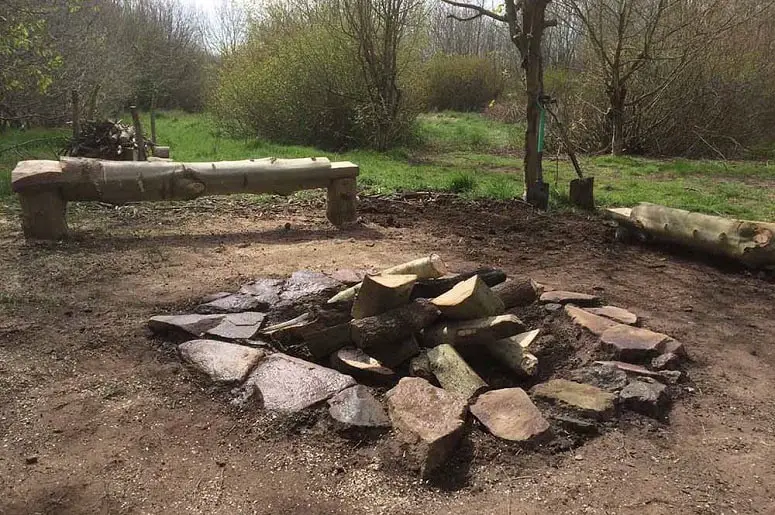
The number one way to ensure you’re being a good neighboring camper is to leave zero trace behind after you’ve gone away.
This sounds simple, like reminding yourself to pack everything up, but there are a lot more principles to adhere to and more helpful tips than you might imagine. You can:
- Make Smaller Campfires: These are easier to clean up, and require less firewood to get started. Fires will be easier to put out, and last for slightly shorter durations.
- Leave Things Untouched: Quite literally, leave stones unturned. Disturb as little of an area as possible, then put everything back the way it was. Try taking a photograph of how the campsite looked when you arrived, and return it to that state before you leave.
- Use Green Products: Reduce your carbon footprint and ensure you’re not tampering with wildlife, all in one go. Get tents, sleeping bags, and other camping essentials made from green, sustainable, eco-friendly materials.
- Bring Trash Home: Brings your own trash bin and bring it home with you. This costs you less in dumping fees if there’s a designated area, but also eliminates littering. Bring an odor-sealing trash bag so it doesn’t smell on the ride home.
- Perform an Equipment Check: Make sure nothing is out of place: small components, tent essentials, and everything in between. Have an active inventory list with everyone you bring, and add any items you purchase before you get there. Make sure nothing is out of place.
These tips are simple but effective to keep your footprint completely invisible.
When you depart from a campsite, you don’t want the next set of campers (or worse, the property managers) coming into a messy, disturbed campsite.
Let’s all avoid additional fees, dumping fines, and ticking off the next family that gets our previous spot.
2. Read the Campground Rules
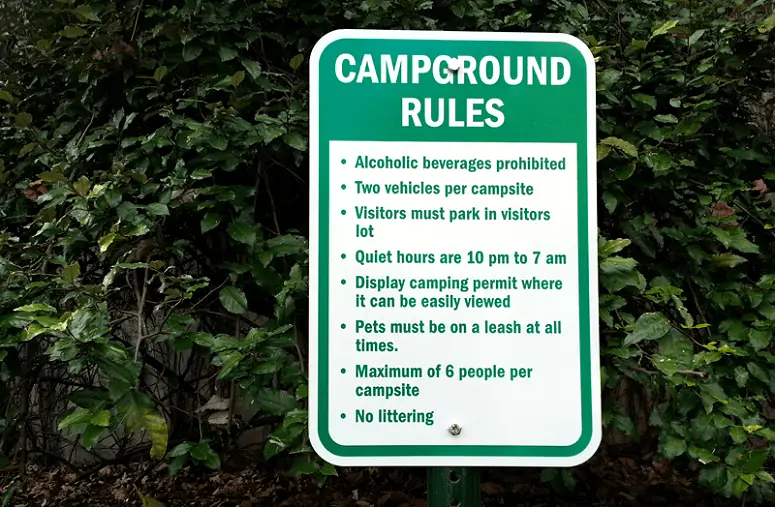
You’ve been camping dozens of times before, maybe even in the same state.
We get it: you know what’s going on and how to be a good camper, but current campground rules may surprise you.
There’s always a few bad apples spoiling the bunch, and there might be odd or otherwise ridiculous restrictions on certain activities on the campsite.
You can dispute it, but if it’s a campground rule, then you’re expected to adhere to it if you wish to stay.
Most campsites update their policies on their websites. For old-school campsites that haven’t entered the 21st century, visit the central office and ask them to print out information that you can take with you.
If that’s still not an option, they might have a sign hanging up somewhere. Take a photo with your phone to bring it with you.
If you’re visiting the on-site office anyway, feel free to ask about specifics that may not be covered on a short list of rules.
3. Treat Quiet Hours as Law
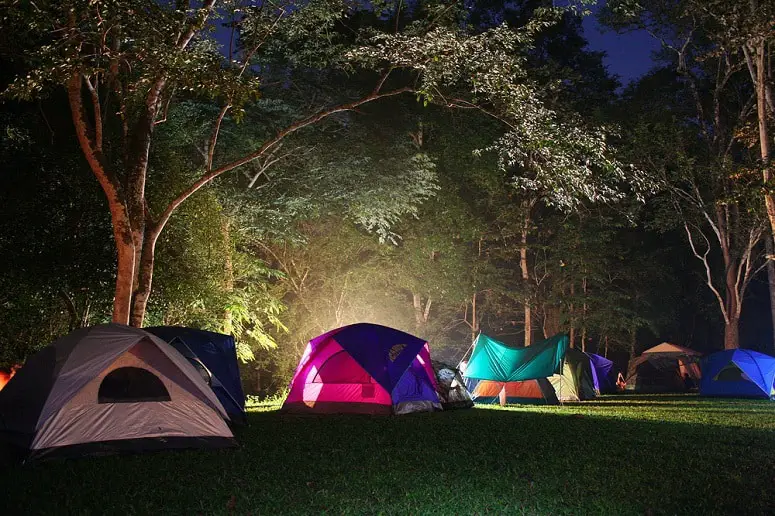
This is both beneficial for you, as it is for everyone else.
If everyone on the campsite respects these quiet hours, you’re going to get to enjoy the stars in peace and quiet, with nothing but the crackling of the campfire and the chatter of good friends to keep you company.
But we all know those guys who blast music from their trucks and talk way too loud at all hours of the night.
If you’re being a good neighbor, then the office/landlords will take you much more seriously if you file a complaint.
This helps you avoid issues with other campers as well. Most people do not immediately go to management to talk about a noise issue; they’re much more likely to go to you directly and try to handle it in a civilized way.
Nobody likes getting an authoritative figure involved unless it’s absolutely necessary, so even if you are loud once, but you’ve been quiet for most of the trip, neighboring campers are more likely to politely ask you to keep it down instead of get you in trouble.
It’s a two-way street, so do the same to other campers, and you’ll find that nine times out of ten, they will respect your request.
4. Buy Campground Firewood
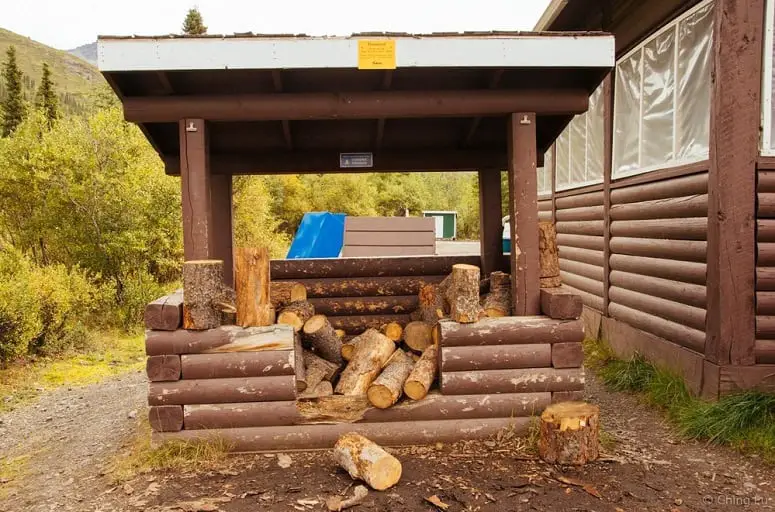
If you’ve been camping for a while, then you’ve been stuck in the motions of buying campground-approved firewood from their store.
The common misconception is that campsites are just looking to put additional rules and regulations on their campsites to coin more money out of campers, but there’s actually an ecological reason for this: foreign firewood can bring pests and disease.
Most people gather firewood from dead sources, meaning they’re not cutting down healthy trees just for firewood.
Those trees died for a reason, which means pests or rot (disease) may be resting inside of that firewood.
A fair amount of campers travel over one hundred miles away from home when they go camping, usually to a different state than they are from, and this can introduce issues to forests that wouldn’t have otherwise happened without human intervention.
While it can be aggravating to buy campground-approved firewood, just know that it is important, and you shouldn’t try to smuggle your own in.
That being said, if you have additional kindling when you’re done with your trip, you usually can’t leave the campsite with it for the same reasons.
You’ll either have to return it (no refunds), or give it to another camper that’s still staying in the area.
5. Be Mindful of Pets
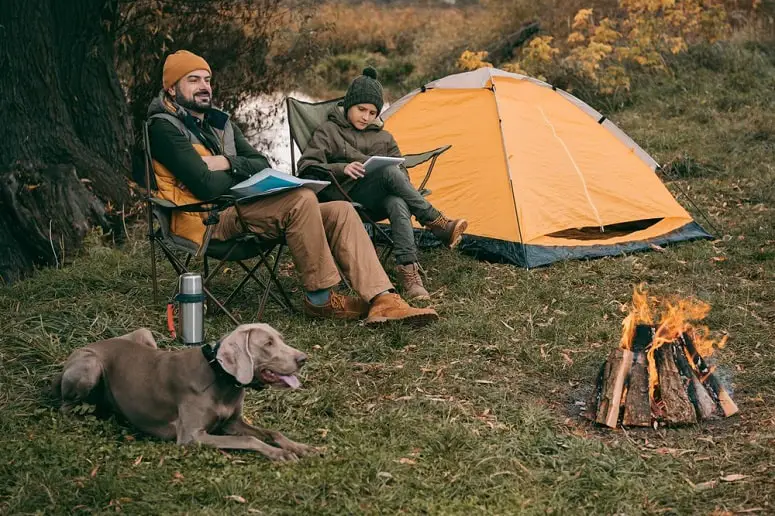
If you have a family pet, you can’t very well leave it at home.
Dog sitters or housesitters for indoor cats come with added costs, usually in the triple digits.
If you’re bringing a dog along for the ride, there’s nothing wrong with that, but you need to check out the campsite rules beforehand.
Some campgrounds don’t allow pets, and some have pet-specific sites in their network, but the fact of the matter is even if you can bring your pet along, your neighboring campers might not be so thrilled.
Don’t let your pets wander around aimlessly. Bring along an extended leash for your dogs, and keep them tied up in a secure space, but with enough slack that they can still maneuver around.
Being mindful of pets also means not letting them near anything dangerous, like the fire pit or the grill.
6. Fire Pits and Garbage Bins Aren’t the Same Thing
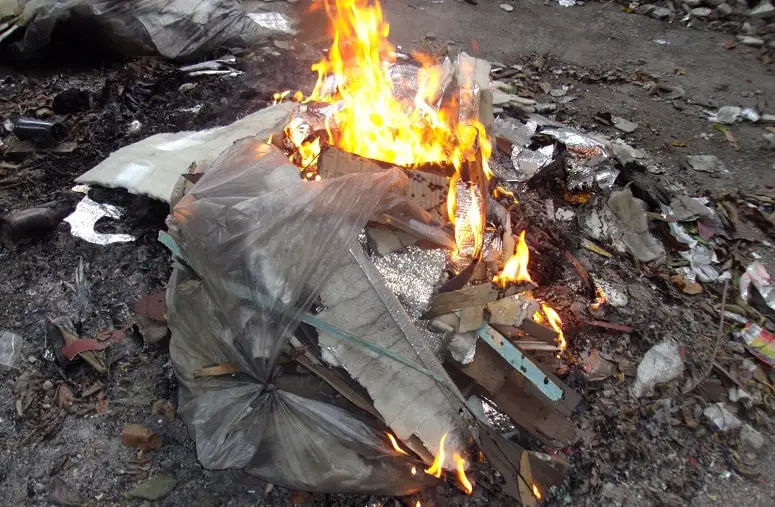
One of the worst things you can do is just burn garbage in the fire pit, and leave it behind.
If there’s already a designated fire pit in your campsite, then the idea is, “Nobody will care, it’s not like the fire is moving anywhere.”
While there’s some truth to that, it’s technically littering and can cause you to incur fines.
On top of that, most trash that goes into a fire pit brings a nasty odor with it.
There’s ink in lots of packaging that can release a repugnant scent, as well as scare off animals from the area.
Bring along your own separate means of storing waste.
You can either use a campground-approved dumping area that specifically deals with trash removal, or you can bring it home with you in a sealed container and dispose of it at your home.
The goal is to leave as little a trace as possible and to not be one of those guys who leaves empty beer bottles or broken glass in the fire pit.
7. Don’t Tread on a Campsite That Isn’t Yours
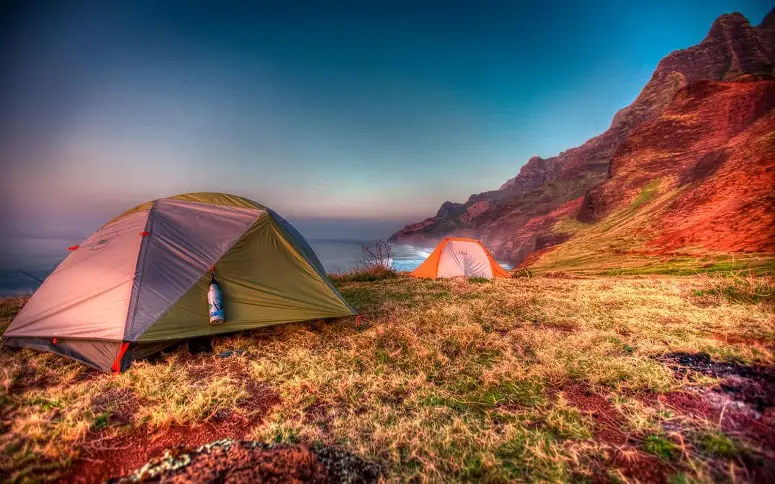
It’s a lot easier than you think to accidentally wander through someone else’s designated camping area, especially if it’s your first time to this specific campground.
The lines aren’t always so clear. If you’re uncertain on the exact boundaries of your campsite, ask whoever is in charge to go with you and give you a perfect depiction of your space.
That way, if there’s an argument over where the line in the sand is drawn later, you can know for certain where your campsite area is.
Even if it’s an easier way to get to the store or pass through the campgrounds, don’t cut through someone else’s site, even when they’re not home.
For all you know, one of them could be staying behind in their fifth wheel or tent, or a neighboring campsite could mention that you were treading on their grounds later.
Avoid the questions, the arguments, and stick to the main roadways to get wherever you need to.
8. Watch Those Lights
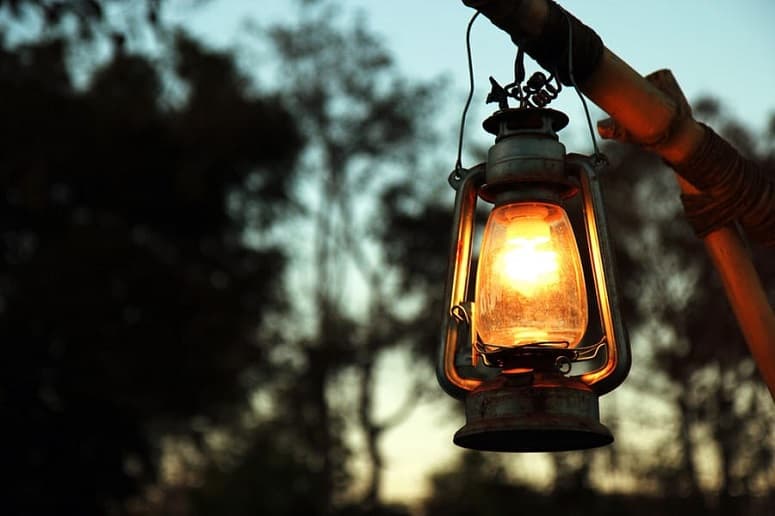
We talked about quiet hours earlier. Even if noise isn’t an issue, shining your lights where they don’t belong could be an issue later on.
If you’re heading into town to hit a bar or do some late-night grocery shopping for breakfast tomorrow, turn out your lanterns, headlamps, or any focused light sources that could be shining into someone else’s campsite.
Keep your lights low, and when the sun goes down, stick to 360-degree sources like lanterns and campfires.
If you’re going to use something more concentrated and powerful, do so within the confines of your tent for reading or hanging out with your friends and family.
One of the main points of camping is to get some peace and quiet, and some rest and relaxation.
That’s going to be difficult for your neighbors if your light is shining through the edge of their tent.
Just to be careful, be sure all the light sources are turned off before you turn in for the night.
Staying Strong and Fully Kitted
There you have it: eight great rules to ensure you’re not bothering anyone on your camping trip, and to have as a stress-free a time as possible.
Between guides like these, information on the top camping gear on the market, and how-to’s on everything in between, we’re your one-stop reading spot to go from newbie camper, to seasoned survivalist.
References:


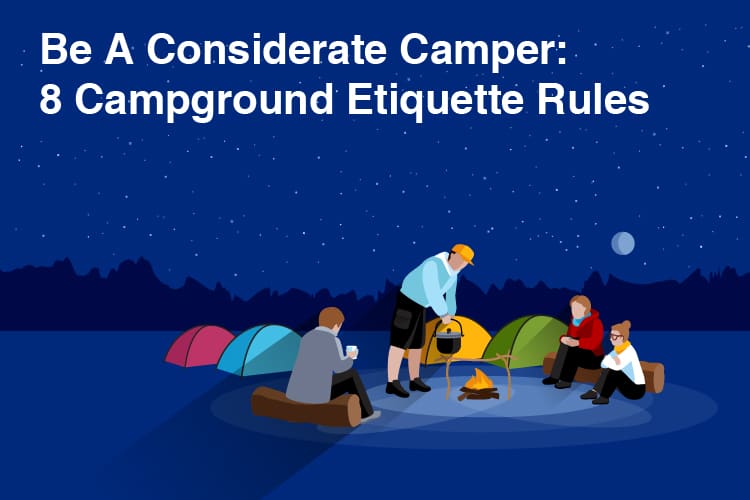

![9 Final Thoughts And Items For Your First Camper Adventure [Checklist] 12 RV Camping Checklist](https://kempoo.com/wp-content/uploads/2018/11/first-camper-adventure.jpg)
